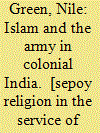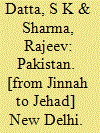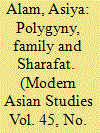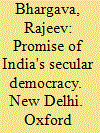|
|
|
Sort Order |
|
|
|
Items / Page
|
|
|
|
|
|
|
| Srl | Item |
| 1 |
ID:
093296


|
|
|
|
|
| Publication |
Cambridge, Cambridge University Press, 2009.
|
| Description |
xvi, 217 p.
|
| Series |
Cambridge studies in Indian history and society; 16
|
| Standard Number |
9780521898454
|
|
|
|
|
|
|
|
|
|
|
|
Copies: C:1/I:0,R:0,Q:0
Circulation
| Accession# | Call# | Current Location | Status | Policy | Location |
| 054703 | 954.0088297/GRE 054703 | Main | On Shelf | General | |
|
|
|
|
| 2 |
ID:
086543


|
|
|
|
|
| Publication |
New Delhi, UBS PUblishers, 2002.
|
| Description |
xii, 348p.hbk
|
| Standard Number |
8174763996
|
|
|
|
|
|
|
|
|
|
|
|
Copies: C:1/I:0,R:0,Q:0
Circulation
| Accession# | Call# | Current Location | Status | Policy | Location |
| 054152 | 954.9/DAT 054152 | Main | On Shelf | General | |
|
|
|
|
| 3 |
ID:
105026


|
|
|
|
|
| Publication |
2011.
|
| Summary/Abstract |
While historians of South Asia have examined in elaborate detail critiques of sati and child marriage in the Hindu community, a similar approach to Muslim familial reform also needs serious attention. By investigating discourses on the question of polygyny, this paper is an attempt in this direction. In the light of these discourses, the paper argues that polygyny, influenced by modern sensibilities of reform and social change, underwent different interpretations during the colonial period. The debate on polygyny was not homogenous and uniform and research reveals a plurality of viewpoints on the subject. The argument was often based on an assumption of sexual difference which, in some cases, emphasized the infertility and reproductive incapacity of the first wife, and in others, presented an idealization of domestic ideology where the second wife made the 'perfect' home. Simultaneously, there were also strong critiques of polygyny by women writers who underscored the misery of the first wife. These debates do not necessarily settle the question in favour of a particular position, but reflect a conversation held on marriage, children and family, and express how love, conjugality and affection were narrated in the public sphere.
|
|
|
|
|
|
|
|
|
|
|
|
|
|
|
|
| 4 |
ID:
096472


|
|
|
|
|
| Publication |
New Delhi, Oxford University Press, 2010.
|
| Description |
xxv, 346p.
|
| Standard Number |
9780198060444, hbk
|
|
|
|
|
|
|
|
|
|
|
|
Copies: C:1/I:0,R:0,Q:0
Circulation
| Accession# | Call# | Current Location | Status | Policy | Location |
| 054981 | 321.80954/BHA 054981 | Main | On Shelf | General | |
|
|
|
|
|
|
|
|
|